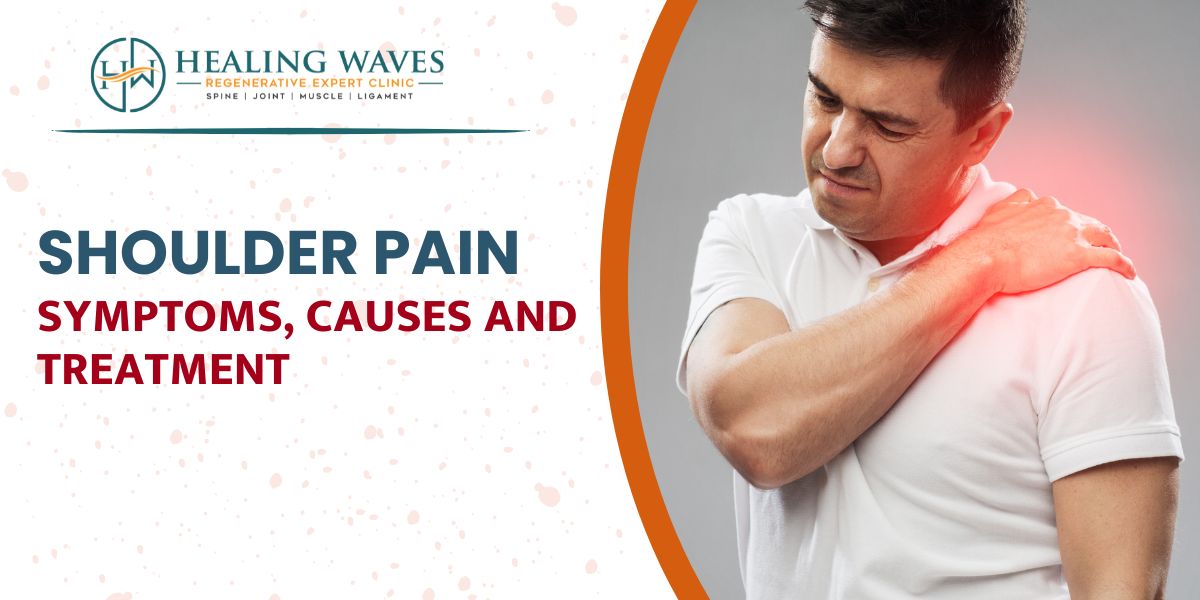- healingwavesclinic@gmail.com

Shoulder pain is a common issue that affects people of all ages, often due to injury, overuse, or underlying medical conditions. Whether it’s a dull ache or sharp discomfort, shoulder pain can limit mobility and impact daily activities. Understanding the symptoms, causes, and treatment options can help you manage the pain effectively.
Shoulder pain can manifest in different ways, depending on the cause. Some common symptoms include:
Stiffness or reduced range of motion – Difficulty lifting the arm or rotating the shoulder.
Sharp or throbbing pain – Discomfort that worsens with movement.
Weakness – Struggling to carry objects or perform routine tasks.
Swelling or tenderness – Inflammation around the shoulder joint.
Radiating pain – Pain spreading to the neck, arm, or back.
If you experience persistent pain, numbness, or weakness, consult a specialist for proper diagnosis.
Several factors contribute to shoulder pain, including:
The rotator cuff is a group of muscles and tendons that stabilize the shoulder. Tears or inflammation (tendinitis) can cause pain, especially when lifting the arm.
This condition causes stiffness and pain due to thickened shoulder capsule tissue, often affecting people with diabetes or those recovering from prolonged immobility.
Joint degeneration or autoimmune conditions can lead to chronic shoulder pain and stiffness.
Inflammation of the bursa (fluid-filled sacs that cushion joints) can cause sharp pain, especially with repetitive movements.
Trauma from falls, sports injuries, or accidents can dislocate the shoulder or fracture bones, leading to severe pain.
Long hours at a desk, heavy lifting, or repetitive motions (like in sports or manual labor) can strain shoulder muscles.
The right treatment depends on the cause and severity of the pain. Here are some common approaches:
Avoid activities that worsen pain and apply ice packs to reduce swelling in acute injuries.
A physiotherapist can design a rehabilitation program to improve flexibility, strength, and mobility.
Over-the-counter anti-inflammatory drugs (like ibuprofen) or prescribed medications can help manage pain.
For severe inflammation, corticosteroid injections provide temporary relief.
If conservative treatments fail, procedures like rotator cuff repair or shoulder replacement may be necessary.
Shockwave Therapy – Promotes healing by stimulating blood flow to injured tissues.
Acupuncture – Helps relieve pain by targeting pressure points.
Massage Therapy – Reduces muscle tension and improves circulation.
Maintain good posture while sitting and standing.
Warm up before exercising and avoid overloading the shoulder.
Strengthen shoulder muscles with targeted exercises.
Take breaks during repetitive tasks to prevent strain.
If shoulder pain persists despite home care, seek professional help. At Healing Waves Clinic, we specialize in advanced, non-surgical treatments for shoulder pain, including:
✅ Physiotherapy & Rehabilitation
✅ Shockwave Therapy for Faster Recovery
✅ Personalized Pain Management Plans
Don’t let shoulder pain limit your life—get expert care today!
📞 Contact Us for the best shoulder pain treatment in Kharadi and regain pain-free movement!
Regenerative Expert Clinic, we specialize in holistic approach, which focuses on helping your body heal and regenerate naturally with innovative powerful technologies.
Modal Box Content
© 2024 Healing Waves Clinic. All Rights Reserved.